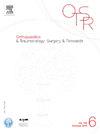One-stage exchange strategy with extensive debridement for chronic periprosthetic joint infection following total knee arthroplasty is associated with a low relapse rate in non-selected patients: a prospective single-center analysis
IF 2.3
3区 医学
Q2 ORTHOPEDICS
引用次数: 0
Abstract
Purpose
This prospective clinical cohort was undertaken to determine the long-term risks of reinfection and all-cause aseptic failure after 1-stage exchange total knee arthroplasties (TKA) in a large series of consecutive patients with periprosthetic joint infection (PJI) following TKA.
Hypothesis
One-stage exchange for chronic PJI is an effective strategy, even in a non-selected population.
Patients and methods
Non-selected patients (152 with 154 PJI) undergoing 1-stage-exchange TKA for PJI (January 2003–August 2015) were prospectively included and monitored for ≥2 years. PJI following TKA satisfying Musculoskeletal Infection Society diagnostic criteria were documented by microbiological culture results of preoperative joint aspirates and/or intraoperative samples. The cumulative incidences of total reinfections (i.e., relapses or new infections) and aseptic revisions were assessed. The mean follow-up (FU) duration was 7.5 years post-reimplantation.
Results
At the last follow-up, 35 knees had developed reinfections: 7 relapses and 28 new infections, with respective 14-year cumulative incidences of 4.8% and 20.6%. The 2-, 5- and 14-year cumulative total reinfection incidences were 12.3%, 21.3% and 24.3%, respectively. Respective 2-, 5-, 10- and 14-year aseptic component-revision incidences were 0.7%, 3.2%, 5.4% and 13.4%. Multivariate analysis retained male sex (HR 3.27, p < 0.01) and preoperative atrial fibrillation (HR 3.03; p = 0.01) as being significantly associated with greater risk of reinfection.
Conclusions
One-stage-exchange TKA with aggressive debridement for chronic PJI is apparently a valid strategy, even for non-selected patients. It was associated with a low relapse rate, prevented morbidity and avoided economic social costs of 2-stage exchange. New infections with a different microorganism were observed more frequently and occurred even after years of FU.
Level of evidence
II; Therapeutic.
对全膝关节置换术后的慢性假体周围关节感染采取一步到位的交换策略并进行广泛清创,与非选定患者的低复发率有关:一项前瞻性单中心分析。
目的:该前瞻性临床队列研究旨在确定大量连续性膝关节置换术(TKA)后假体周围关节感染(PJI)患者在一期置换全膝关节置换术(TKA)后再感染和全因无菌失败的长期风险:假设:对慢性PJI进行单阶段置换是一种有效的策略,即使在非选定人群中也是如此:前瞻性地纳入了因PJI而接受TKA单阶段置换术的非选定患者(152例,其中154例为PJI)(2003年1月至2015年8月),并对其进行了≥2年的监测。术前关节抽吸物和(或)术中样本的微生物培养结果证明,TKA术后PJI符合肌肉骨骼感染学会的诊断标准。评估了总再感染(即复发或新感染)和无菌翻修的累积发生率。平均随访(FU)时间为再植后7.5年:结果:在最后一次随访中,有35个膝关节发生了再感染,其中7个复发,28个新感染:结果:在最后一次随访时,有35个膝关节发生了再感染:7个复发,28个新感染,14年的累计发生率分别为4.8%和20.6%。2年、5年和14年累计再感染总发生率分别为12.3%、21.3%和24.3%。2年、5年、10年和14年的无菌组件翻修发生率分别为0.7%、3.2%、5.4%和13.4%。多变量分析保留了男性性别(HR 3.27,p 结论:男性和女性的发病率分别为0.7%、3.2%、5.4%和13.4%:对于慢性 PJI,采用积极清创的单阶段交换 TKA 显然是一种有效的策略,即使是对未经选择的患者也是如此。它的复发率低,可预防发病,并避免两阶段置换的经济和社会成本。不同微生物的新感染更为常见,甚至在使用 FU 多年后仍会发生:证据等级:II;治疗。
本文章由计算机程序翻译,如有差异,请以英文原文为准。
求助全文
约1分钟内获得全文
求助全文
来源期刊
CiteScore
5.10
自引率
26.10%
发文量
329
审稿时长
12.5 weeks
期刊介绍:
Orthopaedics & Traumatology: Surgery & Research (OTSR) publishes original scientific work in English related to all domains of orthopaedics. Original articles, Reviews, Technical notes and Concise follow-up of a former OTSR study are published in English in electronic form only and indexed in the main international databases.

 求助内容:
求助内容: 应助结果提醒方式:
应助结果提醒方式:


